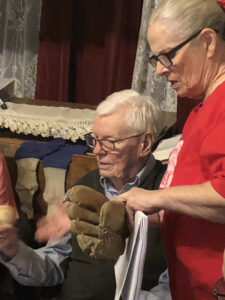M. Gervich and Sons celebrates 120 years in business, leadership transition

T-R PHOTO BY ROBERT MAHARRY — The staff of M. Gervich and Sons, the Marshalltown scrap yard celebrating its 120th anniversary of operation in 2024, poses for a photo outside of the headquarters at 901 E. Nevada St. on Friday morning.
The fact that Morris Gervich escaped from Nikolaev, a city in modern-day Ukraine then under the rule of the Russian Empire, and set out to chase his American Dream in Fort Dodge, Iowa near the turn of the 20th century — only to be convinced, during a train stop, by the small group of Jews living in Marshalltown to stay there instead — is hard to believe. But then again, so is the fact that three subsequent generations of Gervich men, each of whom had originally aspired to a completely different career path, have continued to run the scrap metal yard he founded, which is now one of the community’s longest operating private businesses.
M. Gervich and Sons is celebrating its 120th anniversary in 2024, and, like his father Doug, grandfather Sam and great-grandfather Morris before him, John Gervich has stepped into the top leadership role overseeing 28 employees and carrying the hallowed name into the next generation. It’s quite a legacy for a company started by a man described by his grandson Doug as an activist who had a penchant for protesting and getting into trouble.
“His father said ‘You better leave because they’re out looking for you.’ He took a ride on a truck of manure out of Kyiv,” Doug Gervich said. “I think it took three or four years before he got to this country.”
Like so many other immigrants during the same time period, Morris arrived on Ellis Island, was handed $5 and a loaf of bread and left to fend for himself from there. As John Gervich explained, Morris intended to end up in Fort Dodge because there were enough Jews there where they could practice their faith collectively.
By the time he reached the train station in Marshalltown, however, he was already out of money, and the Jewish residents of the community said they needed 10 men to form a minyan, a quorum that is required for certain religious obligations. Morris stayed and became a collector of bones, hides, furs and metals and would subsequently sell them, eventually leasing a property adjacent to the railroad.
“He had the foresight, the knowledge at the time to know that these things he would collect had marketable value, and (he) could at least do enough with them to get by. So in some ways, he might be a reluctant scrapper or entrepreneur,” John Gervich said.
The company hit its stride and found success in Marshalltown, but in the early days, it also faced intense competition. When Sam returned from serving in the Army during World War II to take over, there were five local scrap yards — several of them bigger than M. Gervich and Sons. By the time Doug returned to town in 1979, the number was down to two, and Krantmans later got out of both scrap and steel, which led Gervich to grow and add new steel operations.
Sam, his grandson explained, went to law school and had every intention of becoming an attorney, but Morris bought him a piece of ground in Marshalltown and convinced him to come back and help run the company with his brother Jules.
Although he never actually practiced himself, John recalled that his grandfather frequently wrote to Rex Ryden, who served as the company’s legal counsel, and tried to put the skills he used in law school to good use. As fate would have it, Doug, a University of Iowa alum, also had plans to leave his hometown, where he said he was one of just a handful of Jews in his elementary school, and become a speech pathologist elsewhere.
“When I graduated high school, I started summer school at Iowa two weeks later. I couldn’t wait to get out,” he said.
With retirement looming, Sam called Doug, who was working as a speech pathologist in Ottumwa and living with his wife Margaret, a fellow Marshalltown native, to gauge his interest in taking over the company — the alternative, in all likelihood, was selling it to a larger corporation. They never figured they’d stay forever, but here they are.
John Gervich’s path back to the family business shares plenty of similarities to the generations before him. After graduating from MHS in 2003, he left for Creighton University and got into medical school there once he had completed his undergraduate degree in Spanish and political science. A few years into medical school, he experienced a change of heart and needed to come up with a Plan B.
“After having my focus entirely on medicine for so long, that tunnel vision kind of left me without a lot of ideas for what I wanted to do. So my mom and dad were gracious enough to let me come back to town,” John said. “When you decide on a profession, if you’re fortunate enough to decide on one, you hope it’s a stress that lights a fire and keeps you going. So looking into what might do that for me, I moved back to town to start thinking.”
In 2014, at the age of 29, he took a job running the scale and got a crash course in the day-to-day operations of the plant, which is headquartered at 901 E. Nevada St., despite mistakenly referring to customers as “patients” on more than one occasion. Nonetheless, he earned high marks from his father, and John liked the low pressure atmosphere of “weighing and paying” while he considered his long-term plans.
While coworkers may have wrongly assumed that he already knew the business inside and out, he joked that he grew up hitting wiffle balls in the warehouse and not necessarily paying much attention to the metal all around him — but he did have at least a few prior experiences running an acetylene torch in high school. He was thankful for the job and the income, but John said it took a few more years before he jumped fully onboard with making M. Gervich and Sons his career.
In 2018, Doug and Margaret started to more seriously contemplate retirement, and John showed a real interest in taking the reins with the preliminary possibility of a corporate buyout once again looming. On the day of the infamous EF-3 tornado, he ran into Claire Hanken, a fellow former Bobcat he had known since their school days. Less than two years later, they were married, and the couple now has three sons together.
“It just kind of became a natural progression. My dad was willing to offer me the opportunity and (it’s) one that I certainly am grateful for and don’t take for granted,” John said.
In 2022, John officially assumed the role of company president, but he still has his father, who comes in every day, to lean on as a resource anytime an issue arises.
“He doesn’t need me. He does not, and what is really interesting, and a little disheartening, is how well John and others maneuver through the way business is changing — technology wise, people not wanting to talk on the phone all that much, they want to do all email — the way he keeps his finger better on the pulse with wages and HR stuff, which none of us like,” Doug said. “When we have conventions or we go to visit a steel mill or we go to visit some scrap people that buy or sell to us, we’re meeting with other 40-year-olds.”
M. Gervich and Sons has adapted to a changing landscape and now buys the majority of the industrial scrap within a 100-mile radius — they’re the “big dog” in the area, as Doug put it — as well as purchasing from peddlers and other professional dealers who don’t have the volume or connections to go directly to a mill. In yet another example of a historical parallel to their own story, the Gerviches frequently work with newer groups of immigrants, primarily from Latin America and Bosnia.
If history repeats itself one more time, John can expect to hand off the business — reluctantly, of course — to the fifth generation of ownership a few decades down the line.
“I would hope (that) after 30 years, or I’ve continued to steer it in a direction that keeps the company strong financially, is still a reliable employer for the 28 guys who have agreed to come onboard and buy into what we’re wanting to achieve here and be proud of the way we conducted our operation here as a member of this community,” he said. “And I would hope that we’ve continued to be good stewards of the resources that we’ve got and we use… You don’t do or accomplish anything on your own.”
And 120 years later, both father and son are proud that they’re still operating in Marshalltown. In John’s words, something about the community just feels right.
“Marshalltown looks a lot different than it did when I grew up,” he said. “We are better as a community for it. We’re better as a company for it. The diverse population brings the town a great spirit (and) more perspectives, and our company benefits from all of that. Our staff (and) crew is more diverse now.”
Doug swells with pride when the workers tell him John is the best boss they’ve ever had, and while M. Gervich may never be able to offer the glitz and glam of some of the city’s larger employers, the company can provide employees with competitive wages and an honest day’s work.
“There comes a time when you realize employees are your most valuable resource, and he got it, really, from the get go,” Doug said. “He understood it right away, which I think is really cool.”
——
Contact Robert Maharry at 641-753-6611 ext. 255 or
rmaharry@timesrepublican.com.





